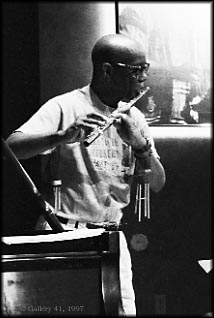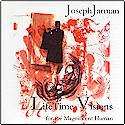

Courtesy of Joseph Jarman

Omni Tone
A FIRESIDE
CHAT WITH JOSEPH JARMAN
(December
18, 2002)
When
Roscoe Mitchell told me Jo Jarman had returned to the Art Ensemble, I
was like a fly in shit. And although it took a great loss (the passing
of Lester Bowie) for this great gain, I couldn't help but pine for what
the future had in store. Jarman has increased his recording presence of
late, releasing an album with his group, the Lou Grassi PoBand, as well
as a trio record with Tatsu Aoki. Days before the holidays, I spoke with
Jarman of his return to the Art Ensemble and his recent records, as always,
unedited and in his own words.
FRED
JUNG: Roscoe Mitchell informed me that you have begun playing with the
Art Ensemble once again.
JOSEPH
JARMAN: Yes, I am.
FJ:
Recordings?
JOSEPH
JARMAN: No, I will start with them next month, in January. It was 1993
when I resigned.
FJ: Was your return prompted by the passing of Lester Bowie?
JOSEPH
JARMAN: Yes.
FJ: Do they sound better now then they did when you resigned?
JOSEPH
JARMAN: Yes (laughing). I'm sixty-five now, so time has been good to all
of us.
FJ: Let's touch on the trio project with Robbie and Tatsu.
JOSEPH
JARMAN: I've been playing with them about two years. Originally, I met
Robbie up in Madison, Wisconsin. We did a recording for, I can't think
of his name, for a musician up there.
FJ: Scott Fields.
JOSEPH
JARMAN: Scott, yes. Her playing was very interesting and then she asked
me if I would be interested to play and I said yes. We did a concert in
Chicago and did a recording, which will be released soon. Since then,
we have done several concerts. It is very interesting because it is a
creative music format. It is not predetermined, but it is intuitional,
so it is very interesting to work with them.
FJ: And what freedoms does that allow?
JOSEPH
JARMAN: It is totally in the moment and that is what meditation is all
about, being in the present moment. We've been so very successful in blending
the sound that it has been extraordinary for all of us. I enjoy it. Yes,
because it is music created in this moment, Fred, and not something we've
done and we don't write it out in the traditional way and play it over.
Basically that is it.
FJ: Another unique aspect of your playing is featured on a Lou Grassi
PoBand record on CIMP, very reminiscent of early Art Ensemble.
JOSEPH
JARMAN: Yeah.
FJ: And although with a large ensemble, there is the sheer depth of musical
ideas, yet the pitfall of perhaps overwhelming the listener.
JOSEPH
JARMAN: You have to remember, Fred, that all those musicians in the recording
that you are talking about are contemporaries. We all sort of grew up
together. We all got into the tradition of the music together, so there
is no overdoing. Everyone has learned how to focus on the sound and allow
the sound to create itself, to blend itself without conflict.
FJ: I got a lot of Song For (Delmark) impressions from The Joy of Being
(CIMP), which featured an unknown Fred Anderson.
JOSEPH
JARMAN: Yes, and I was in Hyde Park in the Southside of Chicago and I
would go up there once a week to his house just to play with him and Billy
(Brimfield). He taught me a lot about creative music just by going up
there and playing with him and he was very inspirational and still is
very inspirational to me.
FJ: Forty years removed, Song For is relevant even today.
JOSEPH
JARMAN: Well, thank you very much. Muhal Richard Abrams had the Experimental
Band at that time and that gave us all tremendous opportunity to synchronize
our work because we would just rehearse with no public performances. Finally,
we did do some public performances, but for a whole year or so, we didn't
do any, but we would rehearse constantly.
FJ: Why did you go into a self-imposed retirement after you resigned from
the Art Ensemble?
JOSEPH
JARMAN: Yes, because I am a Shinsu Buddhist priest and also an apikido
instructor. I have an apikido dojo and a Buddhist temple in Brooklyn.
I felt that I had to devote my total time to those activities. However,
a few years later, in 1996, Leroy Jenkins invited me to do a concert and
I got a commission to do an orchestra piece and I realized that I could
express the Buddhist perspective through the music and since then, that
is what I have been doing. It was very encouraging and enlightening to
me to be able to realize that I could get back into the music and express
realities through the music.
FJ: That kind of meditative serenity is audible in Lifetime Visions.
JOSEPH
JARMAN: It was as it is call, the Lifetime Visions for the Magnificent
Humans and all of the people affiliated with it are members, are or were,
members of the dojo or the Brooklyn Buddhist Association. At the dojo
and the Association, we have many musicians. As a matter of fact, Fred,
now we have a Lifetime Visions Orchestra of twelve musicians. We just
played in France a few months ago. We played in New York several times.
We did a benefit concert for the World Trade Center disaster and we have
done openings for the Visions Festival two years in a row.
FJ: And the future?
JOSEPH
JARMAN: Well, I would like to be able to continue what I am doing now.
Actually, it is working its way back to a triangle. As a matter of fact,
I was just in Japan a few weeks ago. I was invited there to speak about
Buddhism, music, and apikido. It was an extraordinary event. Putting that
together, those three things, I would just like to keep doing those three
things and not allow one to overwhelm any of the others. That is the vision,
for everyone to find their true path and to walk on it.
Fred Jung is the Editor-In-Chief and also can't pay the players of his
Canadian hockey team. Comments? Email
Him